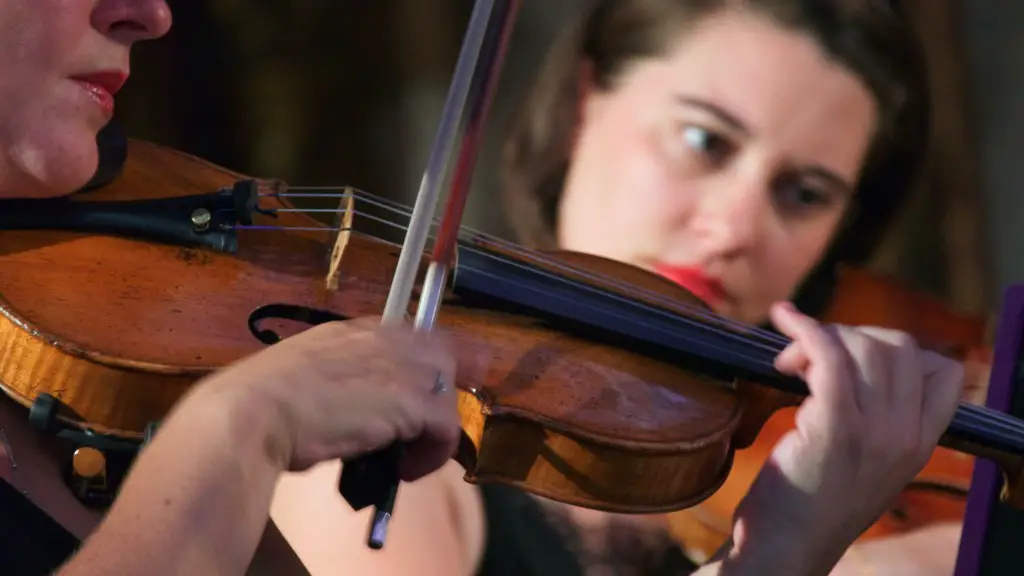Playing the trumpet requires practice, dedication, and the right technique.
Improving your trumpet playing skills can be a daunting challenge. However, with a few simple techniques and a lot of practice, you can dramatically improve your trumpet playing. Here are some tips to help you get started:
1. Develop good posture – When playing the trumpet, make sure your body is in the right position. This includes maintaining an upright posture with your feet slightly apart and keeping your arms close to your body.
2. Understand how to hold the instrument – You should understand how to hold the trumpet correctly before you start playing it. Make sure that your hands are relaxed and that the instrument is held firmly in place.
3. Focus on breath control – To play any wind instrument, you need to learn how to control your breath. Make sure that you practice taking deep breaths and exhaling slowly.
4. Practice regularly – To truly master any skill, practice is essential. Set aside time each day to practice and make sure that you focus on perfecting every note.
5. Listen to other musicians – Listening to great musicians can help you improve your own playing by giving you an idea of what great performance is like. Try listening to recordings of professional trumpeters for inspiration.
With these tips in mind, you’ll be well on yourMaintain a relaxed and upright posture while playing the trumpet. Place your feet flat on the floor, keep your back straight, and hold the trumpet at a comfortable distance from your face. Make sure your chin is parallel to the ground and practice proper breathing techniques.
Develop Proper Breathing Techniques
Breathing is an essential part of playing the trumpet, and proper breathing techniques can make a significant difference in the quality of your sound. Good breath control allows you to play with power and dynamic range, while poor breath control can lead to an airy, weak sound. To improve your trumpet playing, it’s important to practice proper breathing techniques.
One important technique is called diaphragmatic breathing, which involves using your diaphragm to provide a steady stream of air for playing. When you inhale, focus on filling up your abdomen with air rather than expanding your chest. This will ensure that you have a full breath when playing the trumpet. When exhaling, use a slow and steady release of air instead of forcing it out quickly.
It’s also important to practice taking deep breaths during your warm-up routine before playing. This will help get your lungs ready for long phrases and extended techniques. Additionally, practice breathing exercises like inhaling and exhaling slowly while counting out loud or singing long tones on one note.
Finally, remember that good posture plays a key role in effective breathing techniques. Make sure that you keep your spine straight and shoulders relaxed when taking breaths so that you can fill up your lungs completely without any tension or restriction in the body. With consistent practice and patience, these breathing techniques can help you improve your trumpet playing significantly!
Creating a Practice Schedule to Improve Trumpet Playing
Practicing the trumpet regularly is essential for improving your skills and advancing your playing. To ensure you’re making consistent progress, it’s important to create a practice schedule that works for you and allows you to work on different aspects of trumpet playing. Start with a realistic goal such as practicing for at least five days each week. Then, determine how much time you can realistically set aside for practice each day and make sure that goal is achievable. Utilize an online or paper calendar to track your goals and progress.
When creating your practice schedule, think about the areas of trumpet playing you’d like to focus on and break down your sessions into manageable chunks of time. This could include warm-ups, scales, etudes, and repertoire pieces. Consider focusing on one specific area each day, such as rhythm or articulation. It’s also important to include breaks throughout your session so that you don’t get overwhelmed or burnt out.
Finally, make sure to challenge yourself. As you become more comfortable with certain exercises or pieces of music, push yourself further so that you can continue improving as a trumpeter. Taking part in masterclasses or lessons with professional musicians is another great way to take your playing to the next level and stay motivated towards achieving your goals!
Warm Up Regularly
Developing good trumpet playing habits starts with proper and consistent warm up. This helps ensure that your chops are in good shape and ready for whatever piece of music you are playing. Begin by warming up slowly, gradually increasing the intensity as you go. Start with long tones, then move onto scales, arpeggios, and other exercises. You should also work on tonguing and articulation for better control over your sound. Finally, end your warmup with some lip slurs or chromatic exercises to help you loosen up and prepare for more difficult pieces. It’s important to warm up regularly in order to prevent fatigue and improve your overall trumpet playing.
Once you have a solid warm-up routine in place, make sure to practice consistently. Set aside time each day to practice and focus on improving specific elements of your technique such as range, articulation, dynamics, tone quality, etc. As you become more comfortable with a particular passage or piece of music, challenge yourself by gradually increasing the tempo so that you can continue to make improvements in your playing. With regular practice and repetition of these exercises over time, you will be able to develop a better sense of control over your sound and technique.
In addition to practice and warmup routines, listening is an important part of improving trumpet playing skills. Listen to recordings of different styles from different players so that you can get an idea of how the trumpet should sound when played correctly. This will help you develop a better sense of balance between air flow and lip tension which will result in a smooth tone quality throughout all ranges of the instrument.
Overall, warming up regularly is an essential part of improving one’s trumpet playing skills. By setting aside time each day for warmups followed by focused practice sessions as well as listening to recordings from other players, it is possible
Learn How to Read Music
Reading music is an essential skill for any musician, especially trumpet players. Knowing how to read music can help you improve your playing by allowing you to better understand the notes and rhythms of a composition. It also helps you learn new pieces of music faster and easier. To improve your trumpet playing, it is important that you learn how to read sheet music. This will give you more freedom to interpret the music and express yourself in a more meaningful way.
Learning how to read music can seem daunting at first, but with some practice and dedication, anyone can master this skill. Start by familiarizing yourself with basic rhythmic notation and familiarize yourself with the notes on the treble clef staff. Throughout this process, take your time and focus on one element at a time so that it becomes second nature. You should also practice sight-reading exercises regularly in order to develop your skills.
It is also important to have an understanding of musical theory. This includes topics such as chord progressions, key signatures, time signatures, and other concepts related to composition. Having an understanding of these concepts will help you better interpret the notes on the page and make your playing sound more professional. Once you have gained some experience with reading music notation, it’s time to start working on new pieces of music.
By following these steps, you will be well on your way to becoming a proficient reader of sheet music. With consistent practice and dedication, soon enough you will be able to play any piece with ease while expressing yourself in a meaningful way through your instrument.
Finding a Good Teacher or Mentor to Improve Trumpet Playing
Finding a good teacher or mentor is an essential part of improving your trumpet playing. A good teacher or mentor can provide guidance, offer feedback, and help you develop the skills needed to become a better trumpet player. The best way to find a good teacher or mentor is to ask around and do some research. Talk to other musicians in your local area, or look online for reviews from past students. You can also ask your school music teachers for recommendations. It’s important to look for someone who has experience teaching trumpet and can communicate effectively with you.
Once you find a good teacher or mentor, set up regular practice sessions with them and be sure to follow their advice. Your teacher can provide detailed instruction on techniques such as embouchure, breath control, articulation, and sound production. They can also give you guidance on repertoire selection and recommend practice methods that are tailored to your individual needs. Taking regular lessons with a qualified instructor is one of the best ways to improve your trumpet playing quickly.
Improving Trumpet Playing
Listening and analyzing recordings of trumpet playing can be a great way to improve your own playing. By listening to recordings, you can get an idea of how different techniques are used in different musical styles. This will help you develop your own musical style and improve your technical skills. You can also listen to how various players use their instruments to create different sounds and textures. This will help you understand the potential of your instrument, as well as give you ideas for new approaches to playing.
It is also important to analyze recordings from a variety of styles, such as classical, jazz, and blues. Listening to different styles will help you develop the ability to adapt your playing style for different genres. Additionally, by listening closely and analyzing recordings, you may discover new techniques or concepts that you can incorporate into your own playing.
Finally, listening and analyzing recordings is a great way to stay motivated. Listening to great musicians can inspire you to keep practicing and developing your skills. It can also be helpful to listen back to recordings of yourself so that you can identify opportunities for improvement or areas where you need more practice.
To Sum It All Up
Improving trumpet playing requires dedication and practice. Make sure to warm up your lips before playing, practice regularly and focus on the basics. Use a metronome to develop your sense of timing and tempo and use recordings to compare your sound with that of professional players. Finally, don’t forget to have fun while learning! With hard work and dedication, you should be able to take your trumpet playing to the next level.
Developing good trumpet-playing habits is an important part of improving as a musician. Be sure to pay attention to posture, breathing, and finger placement while you practice. Additionally, focus on the fundamentals such as scales and chords in order to master the instrument. Lastly, always seek out feedback from experienced players or instructors.
In conclusion, becoming a better trumpet player takes time and effort. Start by mastering the basics such as proper posture and breathing technique. Use a metronome for timing control and listen to recordings for comparison purposes. With regular practice, feedback from experienced players or instructors, you should be able to improve your trumpet playing over time.





